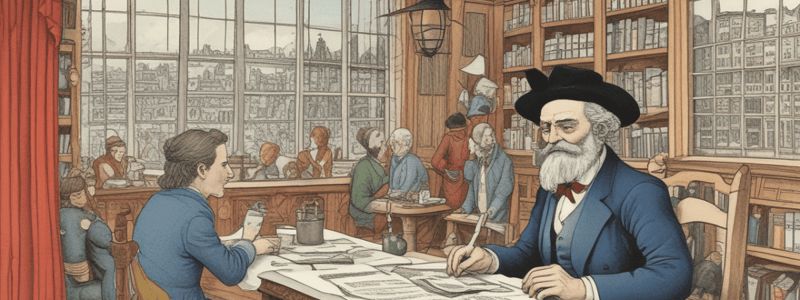Podcast
Questions and Answers
What was the main goal of the Conspiracy of Equals led by Babeuf in 1796?
What was the main goal of the Conspiracy of Equals led by Babeuf in 1796?
- To support the Jacobin terror and suppress the proletariat
- To promote free trade and international commerce
- To overthrow the French monarchy and establish a new government
- To introduce general equality and confiscate all wealth (correct)
What was the key element of Marx's analysis of capitalism, later on?
What was the key element of Marx's analysis of capitalism, later on?
- The principle of agrarian socialism
- The concept of comparative advantage
- The labor theory of value (correct)
- The idea of utopian socialism
According to which economic principle should countries specialize their production?
According to which economic principle should countries specialize their production?
- Absolute advantage
- Labor theory of value
- Economic equality
- Comparative advantage (correct)
What was the main idea behind Robert Owen's social reforms?
What was the main idea behind Robert Owen's social reforms?
What is the primary role of the proletariat in Marxist theory?
What is the primary role of the proletariat in Marxist theory?
What was the main achievement of the Jacobins in 1793?
What was the main achievement of the Jacobins in 1793?
What is the 'dictatorship of the proletariat' in Marxist theory?
What is the 'dictatorship of the proletariat' in Marxist theory?
What was the main goal of agrarian socialism advocated by Babeuf and Maréchal?
What was the main goal of agrarian socialism advocated by Babeuf and Maréchal?
What is the principle of society in the phase of communism, according to Marx?
What is the principle of society in the phase of communism, according to Marx?
What was the impact of the ideas of Babeuf and Maréchal?
What was the impact of the ideas of Babeuf and Maréchal?
What is the expected outcome of the revolution, according to Marx?
What is the expected outcome of the revolution, according to Marx?
What was the focus of Robert Owen's social reforms at the New Lanark Mills?
What was the focus of Robert Owen's social reforms at the New Lanark Mills?
What was the significance of the Paris Commune, according to the text?
What was the significance of the Paris Commune, according to the text?
What was the Paris Commune, according to the text?
What was the Paris Commune, according to the text?
What is the role of the 'community' in Marxist theory, according to Engels?
What is the role of the 'community' in Marxist theory, according to Engels?
What is the relationship between the state and society in a communist society, according to Marx?
What is the relationship between the state and society in a communist society, according to Marx?
What was the main criticism of Sojourner Truth in her speech 'Ain't I a woman?'?
What was the main criticism of Sojourner Truth in her speech 'Ain't I a woman?'?
What was the Emancipation Proclamation issued by President Abraham Lincoln in 1863?
What was the Emancipation Proclamation issued by President Abraham Lincoln in 1863?
What three influences inspired Karl Marx's ideas on socialism?
What three influences inspired Karl Marx's ideas on socialism?
What was the main difference between utopian socialism and scientific socialism, according to Marx?
What was the main difference between utopian socialism and scientific socialism, according to Marx?
What was the basis of value, according to Marx?
What was the basis of value, according to Marx?
What was the main goal of early socialism, according to Marx?
What was the main goal of early socialism, according to Marx?
What did Marx label his own theory as?
What did Marx label his own theory as?
What was the Underground Railroad, according to the text?
What was the Underground Railroad, according to the text?
Study Notes
Serfdom and Capitalism
- In the feudal system, serfs owned the tools they used but owed labor to the landlord, paid high interest, and couldn't move.
- In capitalism, the division of labor is between the proletariat (those without the means of production) and the bourgeoisie.
Marxist Theory
- Marx saw capitalism as the last stage in humanity's "prehistory" that would be overthrown by a revolution of the proletariat.
- The proletariat would not suddenly acquire revolutionary aspirations due to their position in the relations of production.
- Organization through a party, trade union, or international became important in socialist thought.
- Marx distinguished two historical phases in the struggle to create a society of associated producers:
- The first phase would be initiated by the "revolutionary dictatorship of the proletariat," which represented workers' democracy but still carried the "defects" of capitalist class society.
- The second phase, the phase of communism, would shift from "each according to his possibilities" to "each according to his needs" and abolish the system of wage labor.
Paris Commune
- The Paris Commune was a 71-day uprising from March 18, 1871, to the Bloody Week of May 21-28, 1871, during which the revolt was put down.
- The Commune rejected the installation of the newly elected government and wanted direct democracy in its place.
- The Commune and its violent suppression had a significant international impact, particularly within the labor movement and emerging revolutionary movements.
Early Socialist Movements
- The Conspiracy of Equals (la Conjuration des Égaux) tried to revive revolutionary aspirations in 1796 by staging a coup with the aim of confiscating all wealth and introducing general equality.
- Babeuf demanded the complete abolition of private property and thus wanted to introduce economic equality.
- The agrarian socialism that Babeuf and Maréchal advocated had a great deal of influence in the first half of the 19th century.
Robert Owen and Utopian Socialism
- Robert Owen, a self-educated businessman, developed the idea that social reform could go hand in hand with efficiency, productivity, and profits.
- Owen organized education for children, set up day care for children under five, provided workers with decent housing, better food, and clothing.
- Marx labeled this kind of thinking as utopian socialism, which was grounded in moral, religious, or humanitarian beliefs and did not rise above the intuitively desirable.
Racism and Women's Movement
- Women, white and black, were very active in the anti-slavery movement and played a crucial role in the organization of the Underground Railroad.
- Sojourner Truth, an escaped slave, criticized the 'white' domination of the women's movement in her speech Ain't I a woman? (1851).
- Racism in the US did not disappear after the abolition of slavery by President Abraham Lincoln in 1863.
Marx and Scientific Socialism
- Marx was inspired by three main influences: economic theories, early socialism, and the philosophy of Hegel.
- Marx argued that the basis of value (the price) was labor.
- Marx labeled his own theory as scientific socialism because the categories he used were grounded in the material context of actually existing societies.
Studying That Suits You
Use AI to generate personalized quizzes and flashcards to suit your learning preferences.
Description
This quiz explores Marx's ideas on the transition from feudalism to capitalism, the role of the proletariat and bourgeoisie, and the potential for a revolution.



